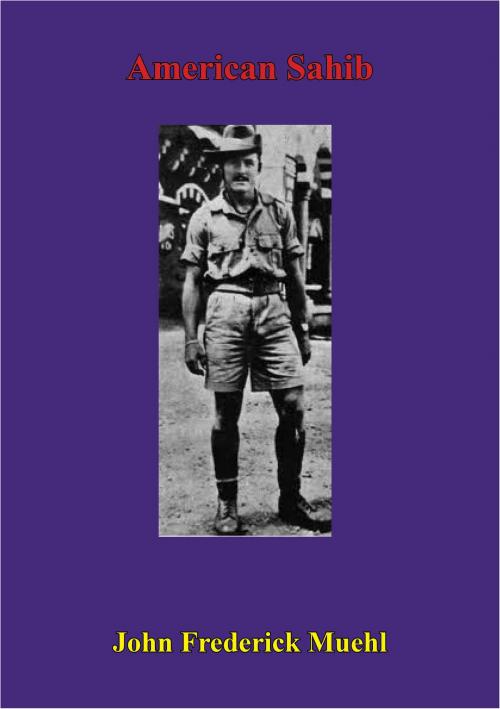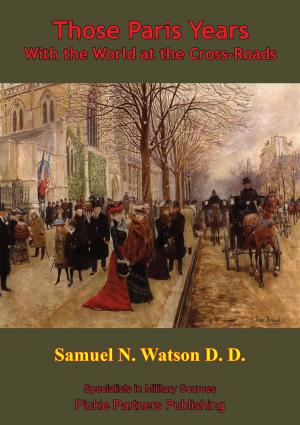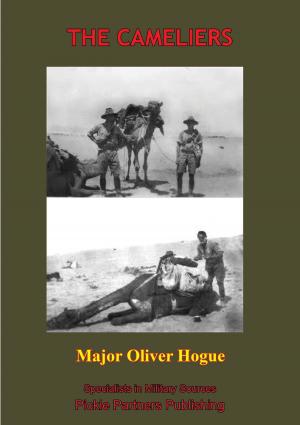| Author: | John Muehl | ISBN: | 9781782892625 |
| Publisher: | Lucknow Books | Publication: | August 15, 2014 |
| Imprint: | Lucknow Books | Language: | English |
| Author: | John Muehl |
| ISBN: | 9781782892625 |
| Publisher: | Lucknow Books |
| Publication: | August 15, 2014 |
| Imprint: | Lucknow Books |
| Language: | English |
AN AMERICAN MEDIC ATTACHED TO THE BRITISH INDIAN ARMY DURING WORLD WAR TWO RECOUNTS HIS EXPERIENCES.
John Muehl saw India as few Americans, few Britons, and few Indians ever have the chance to see it. He was with the American Field Service, attached to the British Indian Army, and wore British uniform. "I could travel the length and breadth of the country, with the blessing of the Raj but without its stigma. I was a ‘pukah sahib’ in the Poona Club, a tommy in the Lady Lumley Canteen, an American tourist in Gorpuri Bazaar, and simply a friend to Raman and Singh."
He mingled with the Sikhs and Gurkhas and other Indians who fought under the British not for love of empire or for hate of Japan but for their board and keep. "Nay British sahib-American sahib," he would say when Indians showed reluctance to talk with him. Admiration for America was great enough-though it turned to suspicion by the end of this war in which America seemed to make common cause with the Raj-so that this phrase usually broke down the barrier. And AMERICAN SAHIB is John Muehl’s journal of a year. It is an inside story of appalling poverty, famine, and political ferment among the Indians, and of bungling, brutality, and hypocrisy on the part of the British rulers. Fortunately for the reader, the dark picture is lightened with humor and with a sense of the patient philosophy that sustains India.
This young American’s first shock came when he learned through personal conversations in exclusive officer’s clubs that the Briton in India does not conceive himself as graciously bearing the white man’s burden, as the propaganda would have us believe. In private, the Briton admits almost boastfully that India’s function is to serve as a source of raw materials for England and a market for her products, and if she is ground down in the process that is her worry...
Through John Muehl’s eyes and ears, we too can see India and hear its people.
AN AMERICAN MEDIC ATTACHED TO THE BRITISH INDIAN ARMY DURING WORLD WAR TWO RECOUNTS HIS EXPERIENCES.
John Muehl saw India as few Americans, few Britons, and few Indians ever have the chance to see it. He was with the American Field Service, attached to the British Indian Army, and wore British uniform. "I could travel the length and breadth of the country, with the blessing of the Raj but without its stigma. I was a ‘pukah sahib’ in the Poona Club, a tommy in the Lady Lumley Canteen, an American tourist in Gorpuri Bazaar, and simply a friend to Raman and Singh."
He mingled with the Sikhs and Gurkhas and other Indians who fought under the British not for love of empire or for hate of Japan but for their board and keep. "Nay British sahib-American sahib," he would say when Indians showed reluctance to talk with him. Admiration for America was great enough-though it turned to suspicion by the end of this war in which America seemed to make common cause with the Raj-so that this phrase usually broke down the barrier. And AMERICAN SAHIB is John Muehl’s journal of a year. It is an inside story of appalling poverty, famine, and political ferment among the Indians, and of bungling, brutality, and hypocrisy on the part of the British rulers. Fortunately for the reader, the dark picture is lightened with humor and with a sense of the patient philosophy that sustains India.
This young American’s first shock came when he learned through personal conversations in exclusive officer’s clubs that the Briton in India does not conceive himself as graciously bearing the white man’s burden, as the propaganda would have us believe. In private, the Briton admits almost boastfully that India’s function is to serve as a source of raw materials for England and a market for her products, and if she is ground down in the process that is her worry...
Through John Muehl’s eyes and ears, we too can see India and hear its people.



![Cover of the book A Company Of Tanks [Illustrated Edition] by John Muehl](https://www.kuoky.com/images/2013/january/300x300/9781782891161-qWPj_300x.jpg)


![Cover of the book 506 Parachute Infantry Regiment In Normandy Drop [Illustrated Edition] by John Muehl](https://www.kuoky.com/images/2014/august/300x300/9781782893523-CRT0_300x.jpg)



![Cover of the book Gallipoli Diary Vol. I [Illustrated Edition] by John Muehl](https://www.kuoky.com/images/2015/november/300x300/9781786251077-UIzh_300x.jpg)
![Cover of the book From Mons To Loos - The Diary Of A Supply Officer [Illustrated Edition] by John Muehl](https://www.kuoky.com/images/2014/august/300x300/9781782894681-tsvI_300x.jpg)


![Cover of the book Reminiscences Of A Grenadier [Illustrated Edition] by John Muehl](https://www.kuoky.com/images/2015/november/300x300/9781786251121-I7d1_300x.jpg)
